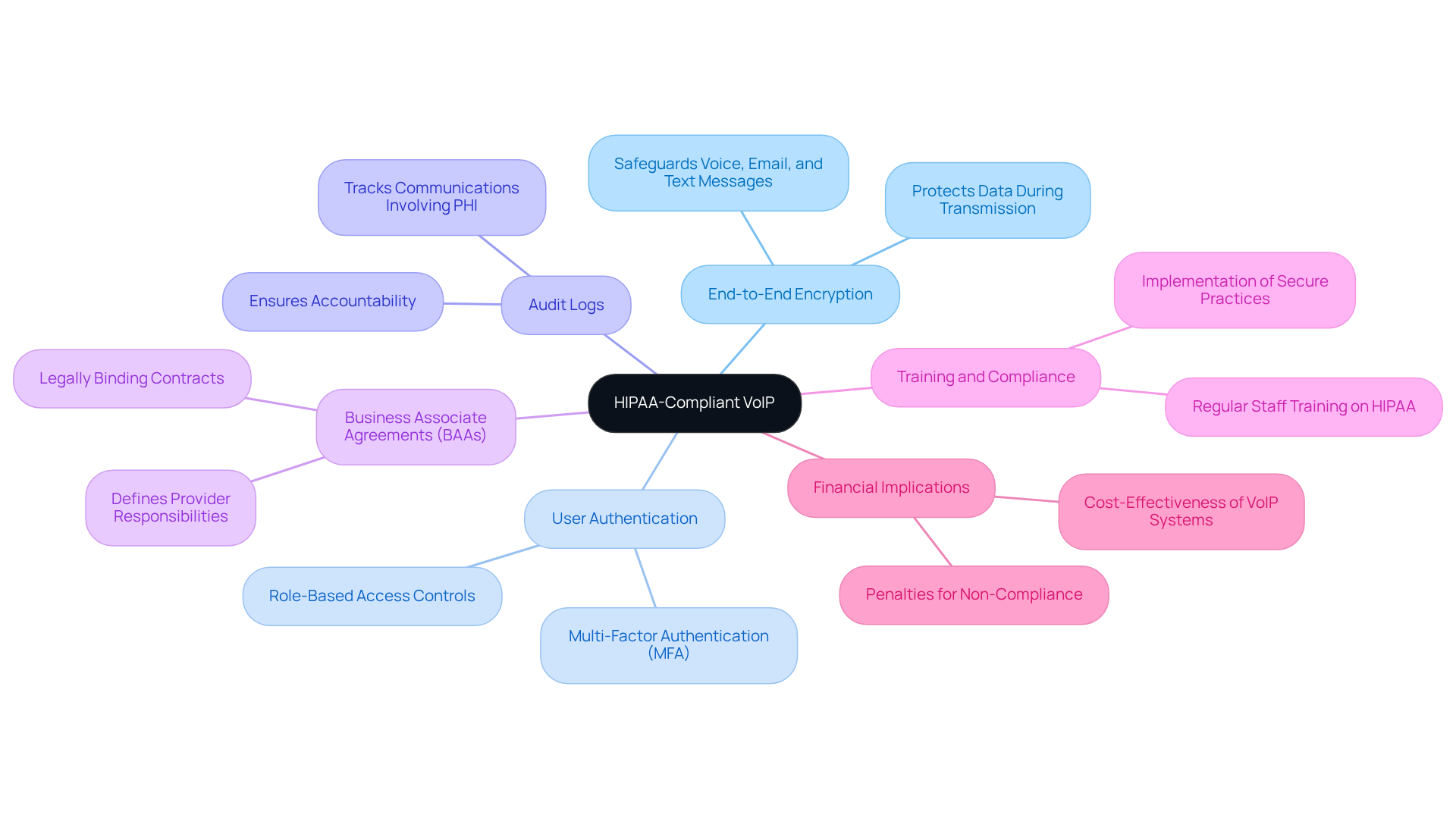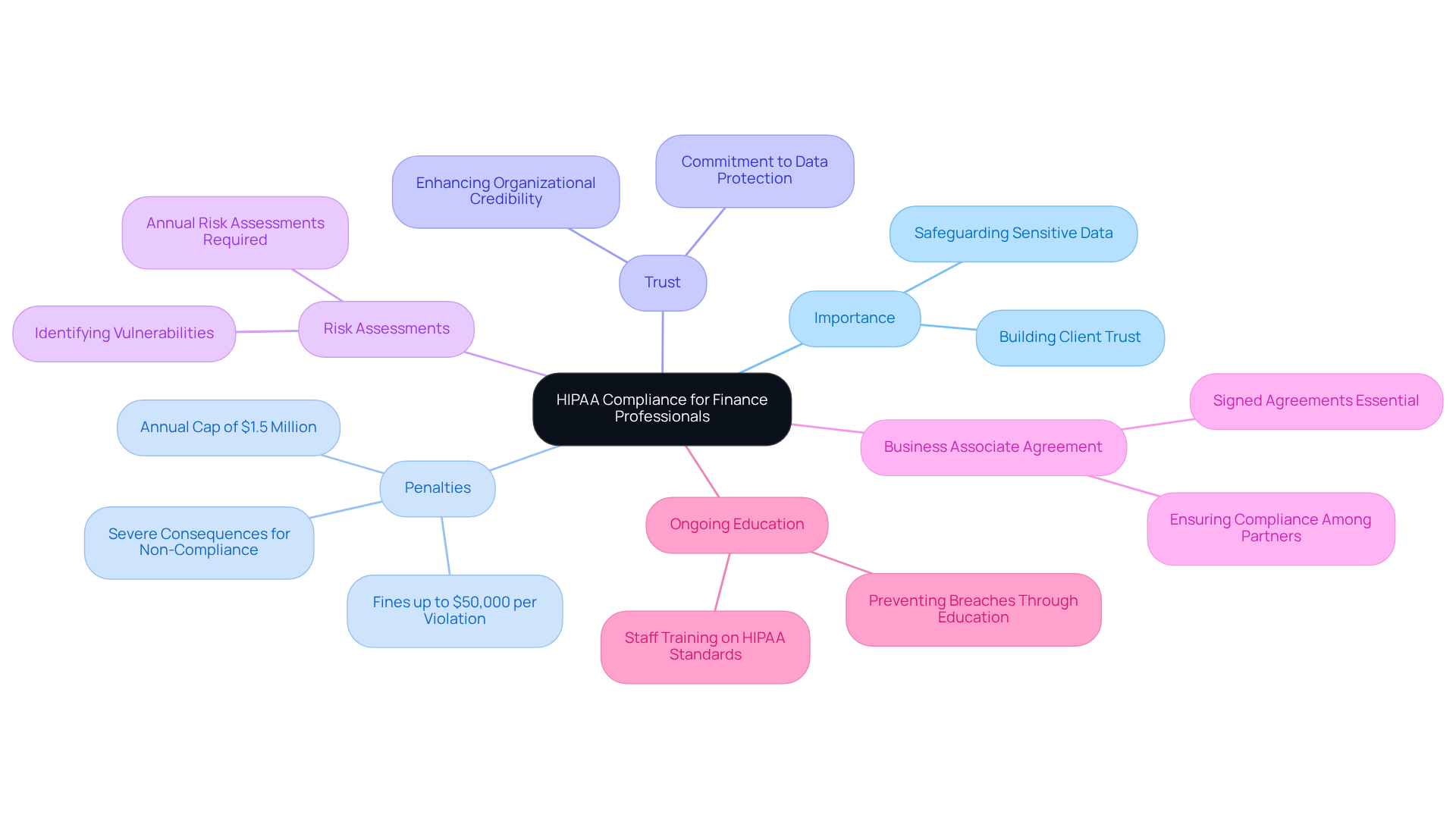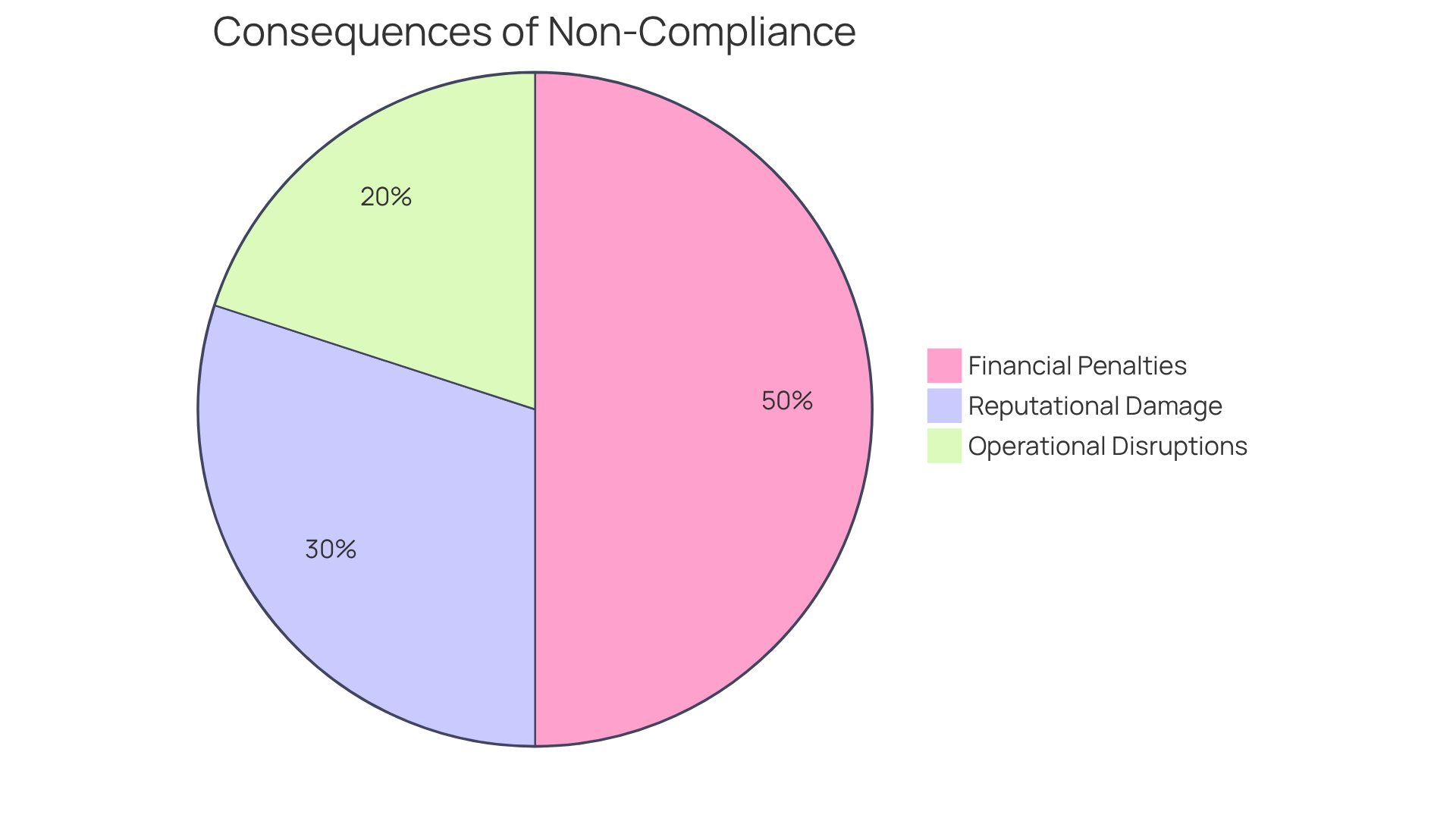Introduction
Navigating the complex landscape of healthcare finance demands a sharp understanding of regulatory frameworks, particularly the Health Insurance Portability and Accountability Act (HIPAA). For finance managers, integrating HIPAA-compliant Voice over Internet Protocol (VoIP) systems transcends a mere technical upgrade; it serves as a crucial safeguard for sensitive patient information that underpins financial transactions.
As the stakes escalate with rising data breaches and substantial penalties for non-compliance, a pressing question emerges: how can finance professionals ensure their communication practices not only adhere to regulatory standards but also bolster client trust and operational integrity? This inquiry is not just relevant; it is essential for maintaining a competitive edge in an increasingly scrutinized industry.
Defining HIPAA-Compliant VoIP: Key Features and Requirements
HIPAA compliant VoIP systems are essential for safeguarding sensitive patient information in accordance with health regulations. These systems are designed as HIPAA compliant VoIP solutions, meeting the stringent standards set by the Health Insurance Portability and Accountability Act (HIPAA) and incorporating critical features such as end-to-end encryption. This ensures that data remains secure during transmission, while secure user authentication prevents unauthorized access. Moreover, thorough audit logs of all communications involving Protected Health Information (PHI) are maintained, which is vital for adherence and accountability.
A fundamental requirement for HIPAA compliance is the establishment of Business Associate Agreements (BAAs) with service providers. This ensures that all parties involved in handling PHI adhere to HIPAA regulations. This is particularly crucial in the finance sector, where discussions may involve sensitive health-related financial information. Recent reports indicate that approximately 65% of internet telephony providers offer HIPAA-compliant solutions, reflecting a growing recognition of the need for secure communication channels in healthcare-related financial transactions.
Organizations that implement HIPAA compliant VoIP systems, such as those offered by Intone, have reported enhanced security and improved patient trust. Intone's AI Voice Agents specifically enhance healthcare communication by efficiently managing appointment inquiries and providing basic patient support. This streamlining of processes is essential for effective patient management. The incorporation of these features is vital for protecting patient data and ensuring that financial communications remain secure and compliant with legal standards. Non-compliance with healthcare privacy regulations can lead to significant financial penalties, underscoring the importance of adhering to these rules.

Importance of HIPAA Compliance for Finance Professionals
For finance experts, adhering to health privacy regulations is not just important - it's essential. These regulations safeguard sensitive health data linked to financial transactions, such as health savings accounts and insurance claims. Non-compliance can result in severe penalties, with fines soaring up to $50,000 per violation and an annual cap of $1.5 million. In 2015 alone, over 112 million records were compromised due to privacy violations, underscoring the gravity of the issue and the risks associated with non-compliance.
Moreover, upholding these regulations fosters trust with clients, demonstrating a commitment to protecting their personal data. Organizations must conduct annual risk assessments to ensure compliance, a proactive measure that finance professionals should prioritize. Additionally, having a signed Business Associate Agreement (BAA) is crucial, ensuring that all partners handling sensitive information adhere to privacy standards.
Ongoing staff education on health information privacy standards is vital to prevent breaches and maintain compliance. In a time when data breaches are increasingly prevalent, finance professionals must prioritize HIPAA compliance to mitigate risks and safeguard their organization's reputation. By taking these steps, they not only protect sensitive information but also reinforce their credibility in the industry.

Core Components of HIPAA-Compliant VoIP Systems
When it comes to HIPAA compliant VoIP, several core components are essential for ensuring the protection of sensitive health information.
-
Data Encryption: First and foremost, all communications must be encrypted. This is crucial for safeguarding Protected Health Information (PHI) from unauthorized access, ensuring that sensitive data remains confidential.
-
User Authentication: Next, robust user authentication methods are a must. Implementing multi-factor authentication guarantees that only authorized personnel can access sensitive information, adding an extra layer of security.
-
Audit Trails: Additionally, maintaining detailed audit trails is vital. Systems must log all communications involving PHI, which are essential for compliance audits and help organizations demonstrate adherence to HIPAA regulations.
-
Business Associate Agreements (BAAs): Furthermore, organizations must establish Business Associate Agreements with their telecommunications service providers. These agreements ensure that all parties involved in handling PHI comply with HIPAA regulations, reinforcing a culture of accountability.
-
Access Controls: Finally, implementing role-based access controls is critical. These controls limit access to sensitive data based on user roles within the organization, ensuring that only those who need access can obtain it.
Collectively, these components ensure that HIPAA compliant VoIP can securely handle sensitive health-related financial information, protecting both the organization and its clients.

Consequences of Non-Compliance: Risks for Finance Professionals
The consequences of non-compliance with HIPAA can be severe for finance professionals. Organizations may face hefty fines, with penalties ranging from $100 to $50,000 per violation, depending on the severity and nature of the breach. Notably, repeated violations can lead to cumulative penalties, potentially reaching a maximum of $1.5 million annually.
Additionally, non-compliance can result in reputational damage, loss of client trust, and potential legal action from affected individuals. For instance, North Memorial Healthcare faced a staggering $1.55 million penalty due to a lack of proper agreements that led to a data breach affecting 290,000 patients. Similarly, Cornell Prescription Pharmacy agreed to pay $125,000 because of improper disposal of PHI, demonstrating the financial consequences of regulatory failures.
Such incidents emphasize the operational disruptions that can occur from regulatory breaches, jeopardizing business continuity. Furthermore, the Office for Civil Rights (OCR) received over 28,000 complaints of possible HIPAA violations in 2019, underscoring the prevalence of these issues in the finance sector.
Therefore, it is essential for finance professionals to prioritize the implementation and maintenance of HIPAA compliant VOIP systems, conduct regular compliance reviews, and protect their operations while upholding client relationships.

Conclusion
Understanding and implementing HIPAA-compliant VoIP systems is essential for finance professionals managing sensitive health-related financial information. These systems not only protect patient data but also ensure compliance with stringent health regulations, safeguarding organizations from potential legal and financial repercussions.
Key elements of HIPAA-compliant VoIP include:
- Data encryption
- Robust user authentication
- Detailed audit trails
- Establishment of Business Associate Agreements
Each component plays a significant role in maintaining the confidentiality of Protected Health Information (PHI) and ensuring that all parties involved in financial transactions adhere to HIPAA standards. Regular compliance assessments and ongoing staff training are critical, as these practices help mitigate risks associated with data breaches and reinforce client trust.
Ultimately, prioritizing HIPAA compliance transcends merely avoiding penalties; it fosters a culture of accountability and trust within the finance sector. By adopting HIPAA-compliant VoIP solutions, finance professionals can enhance their operational integrity, protect sensitive information, and ensure that their organizations thrive in a landscape where data privacy is paramount. Embracing these practices not only safeguards against potential violations but also positions organizations as leaders in ethical financial management within the healthcare industry.
Frequently Asked Questions
What is HIPAA-compliant VoIP?
HIPAA-compliant VoIP refers to voice over internet protocol systems designed to safeguard sensitive patient information in accordance with the Health Insurance Portability and Accountability Act (HIPAA) regulations.
What are the key features of HIPAA-compliant VoIP systems?
Key features include end-to-end encryption for secure data transmission, secure user authentication to prevent unauthorized access, and thorough audit logs of all communications involving Protected Health Information (PHI).
Why are Business Associate Agreements (BAAs) important for HIPAA compliance?
BAAs are essential because they ensure that all parties involved in handling PHI adhere to HIPAA regulations, thereby safeguarding patient information during communications.
How prevalent are HIPAA-compliant VoIP solutions among internet telephony providers?
Approximately 65% of internet telephony providers offer HIPAA-compliant solutions, indicating a growing recognition of the need for secure communication channels in healthcare-related financial transactions.
What benefits have organizations reported from implementing HIPAA-compliant VoIP systems?
Organizations have reported enhanced security and improved patient trust, as well as streamlined processes for effective patient management.
How do Intone's AI Voice Agents contribute to HIPAA-compliant VoIP?
Intone's AI Voice Agents enhance healthcare communication by efficiently managing appointment inquiries and providing basic patient support, which is vital for protecting patient data.
What are the consequences of non-compliance with healthcare privacy regulations?
Non-compliance can lead to significant financial penalties, highlighting the importance of adhering to HIPAA regulations for protecting patient information.






